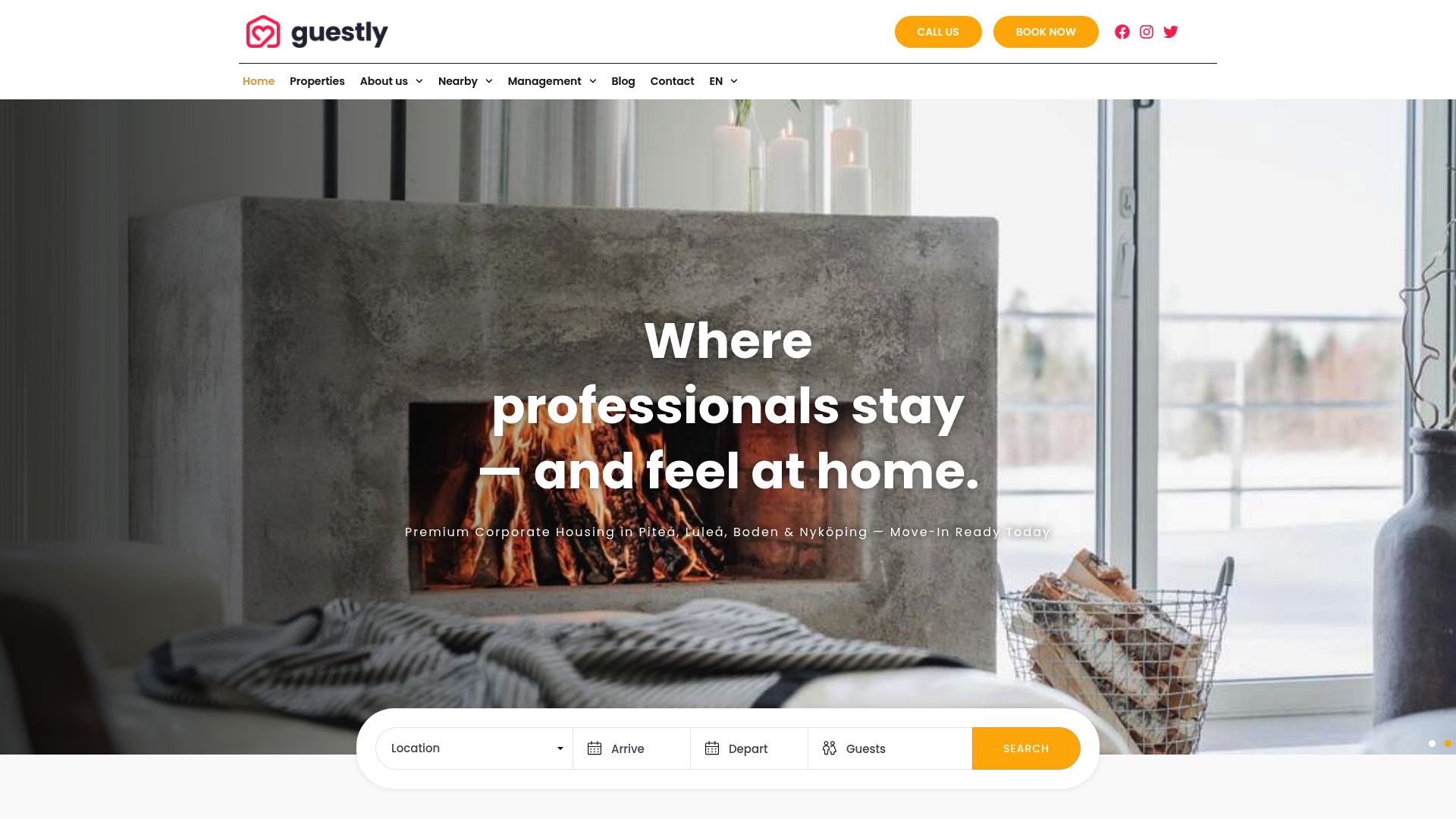|
Getting your Trinity Audio player ready...
|
The demand for flexible, high-quality corporate homes is skyrocketing as professionals seek better alternatives in 2025. Many find traditional rentals, hotels, and unreliable booking platforms fall short—lacking comfort, privacy, and true convenience.
Corporate homes offer a smarter solution. They combine the comforts of home with the productivity and flexibility today’s professionals need, all while being cost-effective for both individuals and companies.
This guide is your one-stop resource to navigating the world of corporate homes in 2025. Discover what sets them apart, their key benefits, how to choose the right one, and the latest trends shaping the industry.
What Are Corporate Homes?
Corporate homes are modern, fully furnished rental properties tailored to the needs of professionals and companies. Unlike traditional rentals or hotels, corporate homes combine the comfort of a private residence with the flexibility and convenience required for business travel. These homes are designed for productivity, relaxation, and seamless living, making them an ideal solution for today’s mobile workforce.

Definition and Core Features
Corporate homes are purpose-built accommodations offering a blend of home comforts and business-ready amenities. They stand apart from hotels, serviced apartments, and standard rentals by providing:
- Fully furnished spaces with kitchen, living room, and laundry facilities
- Flexible lease terms, from weeks to months
- All-inclusive utilities and high-speed WiFi
- Prime locations near business districts or transit hubs
For example, corporate homes in cities like Stockholm, London, and New York often provide easy access to offices, coworking spaces, and major transportation, ensuring a smooth transition for business travelers.
Types of Corporate Housing Solutions
There are several types of corporate housing solutions to suit varying professional needs:
- Short-term corporate homes: Ideal for project-based assignments, lasting from a few weeks to a couple of months.
- Long-term corporate homes: Designed for relocations or extended stays, offering leases for several months or more.
- Private apartments: Entire units for exclusive use, ensuring privacy.
- Serviced residences: Similar to hotels but with apartment-style amenities and added services.
- Shared accommodation: Individual rooms in larger homes, perfect for teams or budget-sensitive professionals.
Each option addresses different scenarios, from solo consultants to entire project teams relocating for a specific duration.
Who Uses Corporate Homes?
Corporate homes serve a wide range of users within the business world:
- Business travelers seeking more than just a hotel room
- Project teams working away from their main office
- Employees relocating to new cities or countries
- Consultants on assignment for weeks or months
- HR and procurement departments arranging housing for staff
Both multinational companies and SMEs leverage corporate homes to provide a comfortable, efficient, and cost-effective living environment for their employees.
How Corporate Homes Differ from Hotels and Airbnb
Corporate homes offer significant advantages over hotels and peer-to-peer rentals like Airbnb:
| Feature | Corporate Homes | Hotels | Airbnb |
|---|---|---|---|
| Privacy & Space | High | Moderate | Variable |
| Work-Ready Environment | Yes | Sometimes | Inconsistent |
| Consistency | High | High | Low |
| Cost for Long Stay | Low | High | Variable |
Unlike hotels, corporate homes provide more space, a dedicated workspace, and the ability to cook and live comfortably. Compared to Airbnb, they offer greater consistency and quality control. For a deeper dive into the distinctions between these accommodation types, see this Corporate housing vs serviced apartments guide.
Market Size and Growth (2025 Data & Trends)
The global corporate homes market is projected to reach new heights in 2025, driven by trends like remote work, global mobility, and project-based assignments. According to industry reports, the market is valued at over $XX billion, with robust growth expected across Europe, North America, and Asia-Pacific.
Remote work adoption and the need for flexible solutions fuel this expansion. Companies seek reliable, scalable housing that matches their employees’ evolving work patterns. Regional trends show high demand in urban business hubs and emerging secondary cities, reflecting a shift toward more dynamic, decentralized workforces.
Key Benefits of Corporate Homes for Professionals
Today’s professionals and companies expect more from their accommodation. The unique advantages of corporate homes go far beyond just a place to sleep—they’re designed to support productivity, comfort, and overall wellbeing for every guest.

Enhanced Productivity and Work-Life Balance
Corporate homes offer dedicated workspaces, high-speed internet, and quiet environments—essentials for modern professionals. Unlike cramped hotel rooms, these spaces are designed to help you focus and get work done efficiently.
For remote workers and traveling project teams, having a separate area to work and relax makes a big difference. Studies show that access to a comfortable, distraction-free environment can boost productivity by up to 20%. With corporate homes, you can maintain your work routine while also enjoying downtime, leading to a healthier work-life balance.
Cost-Effectiveness and Flexibility
One of the biggest draws of corporate homes is their cost-effectiveness for longer stays. When compared to hotels, the savings add up quickly: no extra charges for laundry, dining, or premium WiFi. Flexible lease terms mean you only pay for the time you need, avoiding long-term commitments or hidden fees.
Need to extend your stay or adjust your plans last minute? Corporate homes make it easy. For a deeper dive into how lease flexibility benefits professionals, see Flexible rental options for professionals. This flexibility is crucial for businesses managing shifting project timelines or unexpected changes.
Comfort, Privacy, and Personalization
Corporate homes bring the comforts of home to your business trip. Enjoy a full kitchen, spacious living area, and private laundry—features rarely found in hotels. You have the freedom to personalize your stay, from setting up your workspace to choosing your preferred amenities.
Many professionals say they feel more at ease and productive when staying in corporate homes. Testimonials often highlight the privacy and ability to unwind after work, helping guests feel settled and focused on their goals.
Hassle-Free Relocation and Support Services
Moving for work can be stressful, but corporate homes simplify the process. Relocation support, regular housekeeping, and prompt maintenance are standard, saving both employees and HR teams valuable time.
Most providers offer 24/7 guest assistance and digital check-in/check-out, removing the usual headaches of traditional rentals. This streamlined experience makes corporate homes the preferred choice for companies seeking a reliable, hassle-free solution for their mobile workforce.
Sustainability and Wellbeing
Sustainable living is at the forefront of corporate homes in 2025. Many properties now feature eco-friendly designs, energy-efficient appliances, and green certifications. These initiatives not only help the environment but also align with corporate ESG goals.
Wellbeing is just as important. Amenities like gyms, air filtration, and pet-friendly options support a healthy lifestyle for guests. Data shows a growing demand for sustainable and wellness-focused accommodations, making corporate homes the smart choice for conscious professionals.
How to Choose the Right Corporate Home: Step-by-Step Guide
Finding the perfect corporate homes for your next assignment or project doesn’t have to be overwhelming. With a systematic approach, you can secure accommodations that boost productivity, comfort, and satisfaction. Let’s break down the process into clear, actionable steps.
Step 1: Assessing Your Needs
Start by defining your requirements for corporate homes. Consider the length of your stay, preferred location, and number of guests. Do you need a dedicated workspace, secure parking, or gym access? A quick checklist can help:
- Length of assignment
- Proximity to office or client site
- Required amenities (workspace, kitchen, laundry)
- Number of bedrooms and bathrooms
- Accessibility needs
By outlining these essentials, you’ll quickly filter options and focus only on corporate homes that truly fit your goals.
Step 2: Researching Providers and Platforms
Once you know your needs, explore reputable corporate homes providers. Choose companies specializing in business rentals over general vacation platforms. Look for verified listings, transparent pricing, and reliable guest reviews.
Compare platforms based on:
- Industry reputation
- Customer support channels
- Range of locations and property types
Choosing trusted providers ensures your corporate homes experience is consistent and hassle-free.
Step 3: Evaluating Location and Accessibility
Location is key for corporate homes. Prioritize properties close to your office, transport hubs, and essential amenities like supermarkets or gyms. Evaluate the safety, neighborhood vibe, and commute times.
Many platforms offer map-based search tools to visualize options. Consider:
- Walking distance to business centers
- Access to public transport
- Local dining and recreation
A well-chosen location makes corporate homes more convenient, reducing stress and daily travel time.
Step 4: Comparing Amenities and Services
Not all corporate homes offer the same amenities. Decide which features are essential and which are nice-to-have. Use a simple table to compare options:
| Amenity | Essential | Optional |
|---|---|---|
| High-speed WiFi | ✓ | |
| Housekeeping | ✓ | |
| Gym access | ✓ | |
| Fully equipped kitchen | ✓ | |
| Parking | ✓ |
Clarifying priorities helps you select corporate homes that support both productivity and comfort.
Step 5: Understanding Lease Terms and Policies
Before committing, review the lease terms for your chosen corporate homes. Focus on booking flexibility, cancellation policies, and extension options. Key contract clauses to check:
- Early termination policy
- Deposit and refund terms
- Insurance requirements
- Maintenance and guest support
Clear terms protect both you and your company, ensuring your corporate homes stay is smooth from start to finish.
Step 6: Booking and Move-In Process
Booking corporate homes is often a digital-first experience. Complete required documentation online, verify identification, and confirm reservation details. Many providers offer digital check-in and onboarding.
A typical timeline:
- Submit inquiry
- Receive offer and review contract
- Sign lease and provide ID
- Move-in instructions sent electronically
This streamlined approach saves time and gets you settled in your corporate homes quickly.
Step 7: Managing Your Stay and Troubleshooting Issues
Ongoing support is vital during your stay in corporate homes. Make sure your provider has responsive communication channels for maintenance or service requests.
If you need to extend your stay, inquire early about availability. For any issues, submit support tickets and track resolution. Top providers will offer:
- 24/7 guest assistance
- Proactive updates
- Simple feedback processes
A responsive team ensures your corporate homes experience remains positive throughout your assignment.
Guestly Homes: A Leading Solution for Corporate Housing in Sweden
Guestly Homes delivers premium corporate homes across Sweden, including Piteå, Luleå, Boden, and Nyköping. Designed with professionals in mind, these rentals offer high-speed WiFi, modern workspaces, and eco-friendly features.

Guests enjoy flexible stays, multilingual support, and amenities like housekeeping and 24/7 gym access. Trusted by leading companies, Guestly Homes combines transparent pricing with a seamless digital experience—making it a top choice for corporate homes in Sweden.
Trends Shaping Corporate Homes in 2025
The landscape of corporate homes is evolving rapidly, driven by shifts in work culture, technology, and traveler expectations. As we look toward 2025, several key trends are set to redefine how professionals and companies select and use corporate homes for business travel, relocation, and project work. Understanding these trends is essential for staying ahead in a competitive market.

Rise of Remote and Hybrid Work
Remote and hybrid work models are now the norm, fueling a surge in demand for flexible, work-ready corporate homes. Companies are increasingly supporting distributed teams and remote assignments, making it crucial for accommodations to offer dedicated workspaces and reliable connectivity. According to 10 Corporate Accommodation Trends to Watch in 2025, more than half of professionals now prefer corporate homes over traditional hotels for long-term remote projects. This shift is reshaping corporate travel policies and driving innovation in accommodation options.
Technology and Smart Living
Technology is transforming the guest experience in corporate homes. Smart home features like keyless entry, automated climate control, and virtual tours are now standard in many properties. Digital booking platforms and AI-powered recommendations are making it easier than ever for professionals to find and reserve suitable accommodations. These advancements not only streamline processes but also boost satisfaction by providing a seamless, user-friendly experience. As tech integration deepens, corporate homes are set to become even more efficient and intuitive for business travelers.
Sustainability and Green Living
Sustainability has become a top priority for both companies and employees when choosing corporate homes. Eco-certified properties, energy-efficient appliances, and green building materials are increasingly sought after. Many corporate homes now offer recycling programs, low-impact cleaning services, and wellness amenities that contribute to a healthier environment. This focus on green living aligns with broader corporate ESG goals, meeting the growing demand for responsible and sustainable travel solutions in 2025.
Personalization and Wellbeing Focus
Personalization is at the heart of the modern corporate homes experience. Providers are offering customizable packages that include dietary options, fitness facilities, and wellness amenities tailored to individual preferences. Mental health and comfort have become key considerations, with features like quiet zones, ergonomic furniture, and access to outdoor spaces. These enhancements help professionals maintain balance and wellbeing during extended stays, making corporate homes the preferred choice for those seeking both productivity and personal comfort.
Expansion into New Markets and Segments
The market for corporate homes is expanding beyond major cities into secondary locations and emerging regions. There’s a noticeable rise in niche offerings, such as pet-friendly, family-friendly, and luxury accommodations, catering to diverse professional needs. Regional trends indicate strong growth in Europe, North America, and Asia-Pacific, with more companies recognizing the value of flexible housing options. As demand diversifies, providers are innovating to serve new segments, ensuring that corporate homes remain relevant and competitive in 2025 and beyond.
Corporate Homes vs. Alternative Accommodation Options
Choosing the right accommodation for business travel or relocation is more important than ever in 2025. With so many options available, understanding how corporate homes stack up against hotels, Airbnb rentals, traditional leases, serviced apartments, and co-living spaces can help professionals and companies make the best decision for comfort, productivity, and cost.
Hotels and Extended Stay Hotels
Hotels are a familiar choice for many business travelers, offering daily housekeeping, on-site dining, and loyalty programs. However, they often lack the space and privacy needed for longer stays. In contrast, corporate homes provide a more residential atmosphere with separate living, working, and sleeping areas, which can significantly enhance comfort.
Hotels are best for short visits, but costs add up quickly for extended assignments. A 30-day hotel stay typically far exceeds the cost of a corporate home, especially when factoring in meals and laundry. For professionals seeking flexibility and a sense of home, corporate homes stand out as a more practical solution.
Airbnb and Peer-to-Peer Rentals
Airbnb and peer-to-peer rentals promise local flavor and variety, but consistency can be an issue. Listings vary widely in quality, amenities, and safety standards. Business travelers may face challenges with unreliable WiFi, lack of dedicated workspace, or insufficient support during their stay.
Corporate homes, on the other hand, are specifically designed for professionals. They guarantee reliable amenities and service, along with work-friendly environments. Standardized experiences mean fewer surprises, making corporate homes a safer bet for productivity and peace of mind. For more on how this impacts employee satisfaction, see Employee retention with corporate housing.
Traditional Rentals and Leases
Traditional rentals usually require long-term commitments, hefty deposits, and extensive paperwork. They rarely come fully furnished, leaving professionals to handle everything from utilities to furniture setup, which can be time-consuming and stressful.
Corporate homes eliminate these hurdles with flexible lease terms, all-inclusive pricing, and move-in-ready spaces. This convenience is especially valuable for companies managing frequent relocations or project-based assignments, as it reduces friction for both HR teams and employees.
Serviced Apartments
Serviced apartments offer a blend of hotel-like amenities and residential comforts, often including weekly housekeeping and on-site facilities. However, they may come with higher minimum stay requirements or less flexible contracts compared to corporate homes.
Corporate homes provide similar amenities but often with greater customization and flexibility. Renters benefit from tailored services and transparent costs, making them ideal for both short- and long-term business stays. For a deeper look at evolving options and trends, check out Synergy’s 2025 State of the Industry Report.
Co-Living Spaces
Co-living spaces are gaining popularity among solo professionals and project teams seeking community and networking. They feature shared kitchens, lounges, and social events, which can enrich the travel experience.
However, co-living may not suit those who value privacy or need quiet for work. Corporate homes offer a balance—private spaces with communal amenities when desired. For professionals prioritizing autonomy, comfort, and a work-ready environment, corporate homes deliver the best of both worlds.
The Future of Corporate Homes: What to Expect Beyond 2025
As we look ahead, the future of corporate homes is set to transform how professionals live and work during business assignments. The next wave of changes will be driven by shifting traveler expectations, rapid technological advancements, evolving corporate responsibilities, and significant market growth.
Evolving Needs of Business Travelers
Business travelers are demanding more from their accommodation. Flexibility, wellbeing, and unique experiences are becoming top priorities when choosing corporate homes. With remote and hybrid work models now standard, professionals expect spaces that support both productivity and relaxation.
Recent surveys show a clear shift: more travelers choose accommodations that offer the comforts of home, such as dedicated workspaces and wellness amenities. Preferences also vary by region and industry, so providers must stay agile. According to 2025 Workforce Trends Shaping the Corporate Housing Industry, adapting to these new demands is essential for success in the changing landscape.
Innovations in Corporate Housing
Technology is reshaping the world of corporate homes at a rapid pace. AI-driven personalization, contactless access, and virtual concierge services are now becoming the norm. Imagine walking into a fully furnished space where smart devices automatically adjust lighting and temperature to your preferences.
Digital booking platforms and virtual tours make it easier than ever to select and secure the right property. Providers are also experimenting with new business models, such as flexible inventory and on-demand housekeeping. For a closer look at these advances, check out the Top 10 Trends in Corporate Housing and Business Travel in 2025, which highlights how innovation is enhancing the guest experience.
Policy, Compliance, and Duty of Care
As companies expand globally, policy and compliance around corporate homes is under greater scrutiny. Employers face increasing pressure to ensure employee safety, wellbeing, and legal compliance during international assignments. Duty of care now goes beyond basic accommodation, covering everything from health protocols to emergency support.
Organizations are developing detailed guidelines for selecting and managing corporate homes. This includes vetting properties for safety, ensuring accessibility, and providing support for mental health and wellbeing. These efforts help companies meet regulatory requirements and foster trust with their workforce.
Predictions for Market Growth and Transformation
The corporate homes market is on an impressive growth trajectory. Analysts predict continued expansion, with rising investment in both established and emerging regions. Demand is especially strong in secondary cities and for specialized offerings, such as eco-friendly or pet-friendly homes.
Key disruptors—like remote work, ESG mandates, and tech innovation—are opening new opportunities for providers and companies alike. Looking ahead, we can expect more partnerships, tailored solutions, and a stronger focus on guest experience. As the industry evolves, corporate homes will remain a vital piece of the business travel ecosystem, adapting to meet the ever-changing needs of professionals.
Now that you know what to look for in a corporate home and the trends shaping professional stays in 2025, it’s your turn to find the perfect place that actually fits your needs—not just another cookie-cutter rental. Whether you want to boost team productivity, simplify relocations, or just enjoy a little more comfort on assignment, there’s a better way to do mid- to long-term stays in Sweden. Why not see what’s available right now? You might be surprised at how easy and flexible your next move can be.
See Available Homes


